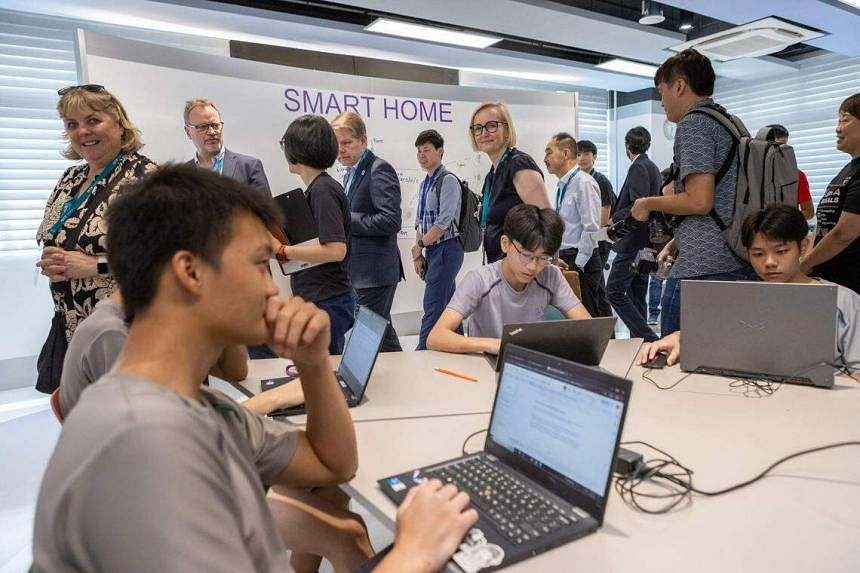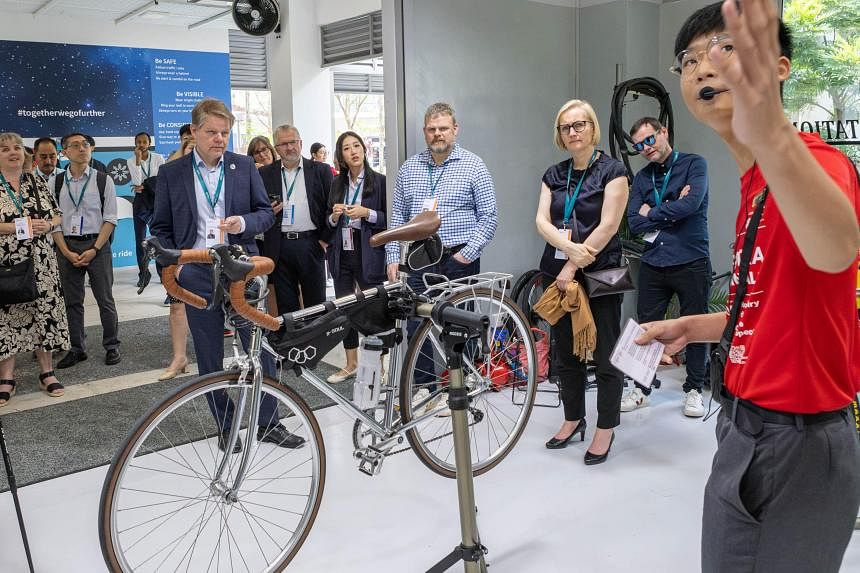SINGAPORE - As schools around the world grapple with generative artificial intelligence (AI), Singapore and Estonia can work together to exchange insights on such tools, said Ms Kristina Kallas, Estonia’s Minister of Education and Research.
“I think both of our countries are open to AI and want to know the opportunities that are there,” she said on the sidelines of the International Summit on the Teaching Profession that Singapore hosted for the first time.
These include using AI as an “assistant” in evaluation and feedback processes, as well as in data analytics and personalised learning for students, she said.
Both countries also increasingly see the need to impart 21st-century skills like analytical thinking and intercultural communication, Ms Kallas said in an interview with The Straits Times on April 23.
“If you read a text or you get a video, to be able to detect whether this information is correct, to detect the bias of the AI, that is critical thinking and it’s crucial for younger generations, otherwise they will not be able to orient themselves in this information-rich world in which they live,” she added.
“Our students are very good at academic skills, yours are especially excellent,” she said. “But Singapore and Estonia have a common challenge compared to many other countries – the resilience and psychological well-being of students is not so good.”
In the latest edition of the international benchmarking study Programme for International Student Assessment, Singapore ranked first in all reading, mathematics and science categories.
Estonia is a top performer in Europe and is among the top 10 countries in all three Pisa categories.
Ms Kallas, who took on her role in April 2023, said education is highly valued in both Singapore and Estonia as “capital you need to acquire in order to succeed in life”.
“We both have been very poor and small societies, countries with no natural resources to rely on,” she added.
“We have this mentality towards education called “aim high, work hard” which is very similar to Singapore. “You need to study, you need to do exams, you need to sit tests.”
But there are also differences, as Estonia has a decentralised education system, she said. “The municipalities that run the schools are very autonomous… We also consider teacher autonomy to be very crucial for success… so the teacher has freedom to decide most of the pedagogical decisions.”
She added: “For example, when Covid-19 happened and the classrooms were closed… teachers were very fast in readjusting their teaching practices because they had the freedom to decide and didn’t wait for anybody to give them instructions.”
Estonia has about 500 schools providing basic education from grades 1 to 9. Children start school at the age of seven and finish at 16, when they take a national exit examination. They then move on to upper secondary education, where they can opt for the academic or vocational tracks.
“All the children in the district go to the same school, so there is no socio-economic segregation, with a few exceptions in the capital city where some of the schools have a right to choose kids,” said Ms Kallas, adding that 94 per cent of children in Estonia attend schools in their district.
Students are tested three times – at the start of the fourth and seventh grades, and in the ninth grade. But the results from the first two exercises are not meant to sort children into classes or schools.
“They are just to see where the progress is, and if we see some lapses in learning outcomes, then we can intervene… We don’t stream kids until the age of 15, or 16,” she said.
Students take three subjects – mathematics, Estonian and another subject of their choice. Most opt to study English language, while some choose science subjects, said Ms Kallas. Some upper secondary schools also conduct their own entrance exams.
Asked how academic rigour is maintained with just three subjects, she said: “Teachers have been arguing that we need to have more exams at the exit level in the ninth grade…
“They say that if there is a national exam, it would raise the quality of teaching because teachers across the country would know that their kids would be tested.”
“We’re in the reform process right now with this,” she said, adding that children’s mental health must also be kept in mind. “Very extensive testing isn’t necessarily the best way to do it… especially if it’s within a very short period of time, it’s too much pressure for children.”
Her ministry is now looking at the role of generative AI in classrooms and has told teachers to be open to the possibilities of such tools, said Ms Kallas, with pilot initiatives expected to be implemented in some schools in September.
“AI is an enormous opportunity for schools and education... The children are already bringing it to schools, so we might as policymakers even be late in designing the policies.”
Estonia is no stranger to the digital space. It had begun to tap technology for teaching and learning as part of a Tiger Leap programme that started in 1997, which aimed to equip all schools with internet access.
“Companies also started being interested in education technologies because schools had a platform to develop edtech products,” said Ms Kallas. These include platforms for parent-school communication and homework assignments. Schools also put up their daily schedules and students’ grades online.

Teachers are at the centre of these efforts to go digital, she said. They are given training and the freedom to decide how much technology to use with their students.
Ms Kallas, who was here on a four-day trip as part of the International Summit on the Teaching Profession, visited several schools here, including Spectra Secondary School and Unity Secondary School.
One of her key takeaways is Singapore’s system of training and retaining teachers, she said. “Estonia has a lot to learn... because our system is less structured and systematic.”
Ms Kallas said many young people become teachers in Estonia, but do not stay for long “because it’s very unstable”. “Very experienced teachers are also leaving. So I’m looking at how Singapore has developed (such a system).”


